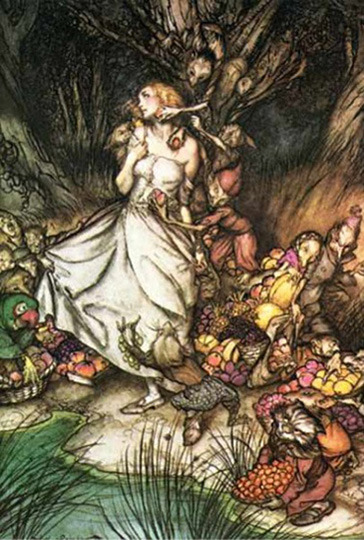“The fallen woman is only seen as the fallen woman because of the rigid gender roles. Without the gender roles, the categorizations of “Fallen Woman” and “Angel in the House” would be non-existant.” (Power)
That’s where I left off on my last post, and that’s where I’ll start on this one. In a stereotypical division of male/female, the females were meant to be submissive, the weaker sex, and that meant following the husband’s wishes and taking care of the family. The categories of Angel in the House and the Fallen Women are merely meant as labels which society places on females to either praise them for living up to the expectations of the home (Angels in the House) or scorning them for being rebellious. (The Fallen Woman.)

At the end of Goblin Market, Lizzie is a mother- she is telling the story to the children- she has become an “angel in the house” even though she was close to being the fallen woman.
If these roles which women have of being the caretaker, or being submissive were not so set, there would be no judgement placed on them if they chose to do what they wanted. These labels strip them of any identity they may have and only judges them according to how they are expected to behave in society. They may even be happy they are not following traditional gender roles; and their acts of sex which could change them into the fallen woman, such as with Moll Flanders, who would rather be a “whore than a wife” may actually empower them.

Not every sex act has to be thought of in terms of domination and subordination. If they both choose to enter into the act; then they are equals. (Are they not? If they have a choice?) Whether or not they hold up to society’s standards of what is right or wrong, is irrelevant, as women can be empowered as much as men. (There are exceptions, but I’m not getting into that.)

In this picture, the girls are turning their heads, fascinated or horrified. The goblin “men” can barely be seen. They are hidden, among the trees and look inhuman. They are not to be approached by the women.
The act of sex shouldn’t be scorned or cause shame, it should be seen as an area in which both people are comfortable, and of equal status. They enter into it willingly, and they can control what they do. It is not society’s problem, it is the couple’s act. Labelling should not and can not be fair with regard to the sex act, regardless of the circumstances because sex is personal. Pubic labels simply do not fit within a private space, and private spaces should not place public labels on anyone.
Thanks for reading! I’m still actively updating my other blog– feel free to follow if you wish!
_____________________________________________________________
WORKS CITED:
IMAGES
- http://www.artrenewal.org/artwork/996/1996/28352/goblin_market:_laura_would_call_the_little_ones-large.jpg
- http://www.imediaconnection.com/images/content/featimage_womenpinterest.jpg
- http://www.uh.edu/engines/goblinmarkettitlepage.jpg
LINKS:
- Jennpower “It’s All Kid’s Stuff.” WordPress. <http://someonetoday.wordpress.com





